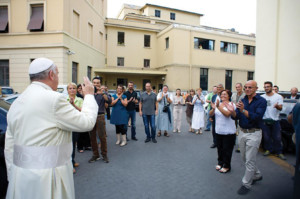
Pope Francis in an informal meeting with Vatican employees.
Pope Francis, on the eve of his first anniversary as Pope, has decided to bring an Australian cardinal, George Pell, to Rome to be the chief executive officer in charge of all Vatican financial matters. Pell will take up his new post in Rome at the end of March.
In a move reflecting both his drive to reform the Vatican bureaucracy and his oft-stated desire to include laypeople in the leadership of the Church, Pope Francis has established a new panel, to include almost as many lay members as clerics, to oversee the finances of the Holy See and Vatican City State.
Another new office, to be headed by Cardinal George Pell of Sydney, will implement the panel’s policies.
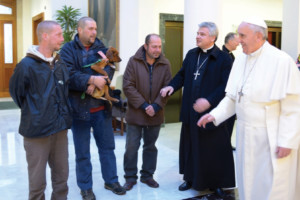
Pope Francis with three homeless men he invited for breakfast.
The Vatican announced the changes in a statement February 24, explaining they would “enable more formal involvement of senior and experienced experts in financial administration, planning and reporting, and will ensure better use of resources,” particularly for “our works with the poor and marginalized.”
The Council for the Economy will include “eight cardinals and bishops to reflect the universality of the church” and “seven lay experts of different nationalities with strong professional financial experience,” the Vatican said. They will “meet on a regular basis and to consider policies and practices and to prepare and analyze reports on the economic-administrative activities of the Holy See.”
The lay members of the new council will exercise an unprecedented level of responsibility for non-clerics in the Vatican, where the highest offices have always been reserved for cardinals and bishops. The Vatican did not release any names of council members.
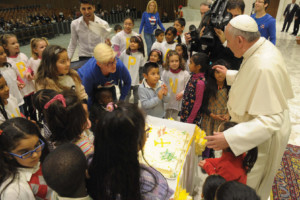
Archbishop Krajewski with children who are helped at the St. Martha dispensary.
Reporting to the council will be the new Secretariat for the Economy, which will exercise “authority over all the economic and administrative activities within the Holy See and the Vatican City State,” including budget making, financial planning, hiring, procurement and the preparation of detailed financial statements.
“I have always recognized the need for the Church to be guided by experts in this area and will be pleased to be working with the members of the new Council for the Economy as we approach these tasks,” Cardinal Pell said in a statement released by the Archdiocese of Sydney, which said he would take up his new position at the Vatican “by the end of March.”
Cardinal Pell is a “man who’s got financial things at his fingertips, and he’s a man who’s very decisive, and I think he’s a got a good understanding of how Roman affairs work,” South African Cardinal Wilfred F. Napier of Durban, who sat on one of the advisory panels that reviewed the arrangements before the pope’s decision, told Catholic News Service.
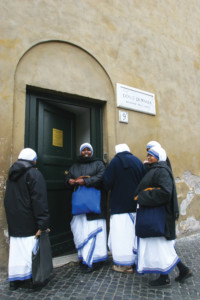
Little Sisters of Charity who help the poor of Rome.
Pope Francis established the council and the secretariat with an apostolic letter given “motu proprio” (on his own initiative), dated Feb. 24, with the title “Fidelis dispensator et prudens” (“Faithful and prudent steward”), a quotation from the Gospel according to St. Luke. The same letter provides for the appointment of an auditor general, “who will be empowered to conduct audits of any agency of the Holy See and Vatican City State at any time.”
The motu proprio makes no mention of the Institute for the Works of Religion, commonly known as the Vatican bank.
The pope acted on recommendations from the Pontifical Commission for Reference on the Economic-Administrative Structure of the Holy See, which he established in July to review accounting practices in Vatican offices and devise strategies for greater fiscal responsibility and transparency.
According to the Vatican, the commission “recommended changes to simplify and consolidate existing management structures and improve coordination and oversight across” the Vatican bureaucracy, and called for a “more formal commitment to adopting accounting standards and generally accepted financial management and reporting practices as well as enhanced internal controls, transparency and governance.”
The recommendations were “considered and endorsed” by the pope’s eight-member advisory Council of Cardinals, which met for its third session Feb. 17-19, and the 15-member Council of Cardinals for the Study of the Organizational and Economic Problems of the Holy See, which met for the last time Feb. 24, since it ceased to exist upon the establishment of the new council.
According to Cardinal Napier, a member of the defunct council, at least some of the prelates on the new panel will be drawn from the former 15-member body.
“Something really to be needed to be done,” Cardinal Napier said of the pope’s actions. “For instance, there was no serious budgeting that you could call budgeting. … It was quite clear that some of the procedures and processes that were in place were not adequate for today’s world.”
The conclave that elected Pope Francis in March 2013 took place amid controversy provoked by the previous year’s “VatiLeaks” of confidential correspondence sensationally documenting corruption and incompetence in various parts of the Vatican bureaucracy.
Among other measures in his first year, Pope Francis established a special commission to investigate the Vatican bank, expanded the scope and enforcement of Vatican City laws against money laundering and the financing of terrorism, and set in motion an overhaul of the church’s central administration, the Roman Curia.
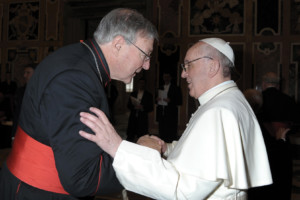
Cardinal George Pell of Sydney greets Pope Francis during his audience with cardinals March 15, 2013, at the Vatican. (CNS photo/L’Osservatore Romano).
Press Release: New Coordination Structure for the Economic and Administrative Affairs of the Holy See and the Vatican State
The Holy Father today announced a new coordination structure for economic and administrative affairs of the Holy See and the Vatican State.
Today’s announcement comes after the recommendations of the rigorous review conducted by the Pontifical Commission for Reference on the Organization of the Economic- Administrative Structure of the Holy See (COSEA) were considered and endorsed by both the Council of 8 Cardinals established to advise the Holy Father on governance and the Committee of 15 Cardinals which oversees the financial affairs of the Holy See.
COSEA recommended changes to simplify and consolidate existing management structures and improve coordination and oversight across the Holy See and Vatican City State. COSEA also recommended more formal commitment to adopting accounting standards and generally accepted financial management and reporting practices as well as enhanced internal controls, transparency and governance.
The changes will enable more formal involvement of senior and experienced experts in financial administration, planning and reporting and will ensure better use of resources, improving the support available for various programs, particularly our works with the poor and marginalized.
The changes announced by the Holy Father include:
1. Establishment of a new Secretariat for the Economy which will have authority over all economic and administrative activities within the Holy See and the Vatican City State. The Secretariat will be responsible, among other things, for preparing an annual budget for the Holy See and Vatican City State as well as financial planning and various support functions such as human resources and procurement. The Secretariat will also be required to prepare detailed financial statements of the Holy See and Vatican State.
2. The Secretariat for the Economy will implement policies determined by a new Council for the Economy — a 15 member Council comprised of 8 Cardinals or Bishops, reflecting various parts of the world and seven lay experts of different nationalities with strong professional financial experience. The Council will meet on a regular basis and to consider policies and practices and to prepare and analyze reports on the economic-administrative activities of the Holy See.
3. The Secretariat for the Economy will be headed by a Cardinal Prefect reporting to the Council for the Economy. He will be supported by a Secretary-General in the management of day to day activities.
4. The Holy Father has appointed Cardinal Pell, the current Archbishop of Sydney, Australia, to the role of Prefect of the Secretariat for the Economy. Details for Cardinal Pell are attached.
5. New arrangements also include the appointment of an Auditor-General, appointed by the Holy Father who will be empowered to conduct audits of any agency of the Holy See and Vatican City State at any time.
6. The changes will confirm the role of APSA as the Central bank of the Vatican with all the obligations and responsibilities of similar institutions around the world.
7. The AIF will continue to undertake its current and critical role of prudential supervision and regulation of activities within the Holy See and Vatican City State.
The Prefect of the new Secretariat for the Economy has been asked to start work as soon as possible. He will prepare the final statutes and other related matters with the assistance of any necessary advisors and will work with COSEA to complete the implementation of these changes approved by the Holy Father.
Cardinal George Pell — Background and Experience
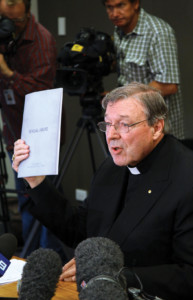
Cardinal George Pell of Sydney holds a copy of Church protocols for dealing with sexual abuse during November 13, 2012.
Cardinal George Pell was born in Ballarat, Australia, on June 8, 1941, and was educated in that city at Loreto Convent and St Patrick’s College. He studied for the priesthood at Corpus Christi College, Werribee, and Propaganda Fide College, Rome, and was ordained a Catholic priest for the Diocese of Ballarat by Cardinal Agagianian in St Peter’s Basilica, Rome, on December 16, 1966.
On May 21, 1987, he was ordained an Auxiliary Bishop of the Archdiocese of Melbourne and Titular Bishop of Scala by Archbishop Sir Frank Little in St Patrick’s Cathedral.
On July 16, 1996, Pope John Paul II announced Cardinal Pell’s appointment as seventh Metropolitan Archbishop of Melbourne. On March 26, 2001 the Holy Father appointed Cardinal Pell the eighth Metropolitan Archbishop of Sydney. His elevation to the Sacred College of Cardinals was announced by John Paul II on September 28, 2003, who created him Cardinal Priest of the Church of Saint Maria Domenica Mazzarello in Rome.
Cardinal Pell holds a Licentiate in Theology from Urban University, Rome (1967), a Masters Degree in Education from Monash University, Melbourne (1982), and a Doctorate of Philosophy in Church History from the University of Oxford (1971). He is a Fellow of the Australian College of Educators, and was Visiting Scholar at Campion Hall, Oxford University, in 1979 and at St. Edmund’s College, Cambridge University, in 1983. He was elected an Honorary Fellow of St. Edmund’s in 2003.
As Archbishop of Sydney he was host for the World Youth Day in Sydney in 2008, when he welcomed Pope Benedict, and the youth of the world, to Australia. He established a second seminary in the Archdiocese, the Redemptoris Mater Seminary of the Neo-Catechumenal way, and the Archdiocese now has a total of around 45 seminarians in formation for the priesthood. His Eminence also established Domus Australia in Rome, a residential centre for pilgrims and visitors, opened by Pope Benedict in 2011.
In April 2005, Cardinal Pell took part in the Conclave of 115 Cardinal Electors which elected His Holiness Pope Benedict XVI as the successor to Pope John Paul II; and in March 2013 Cardinal Pell was a member of the Conclave of 115 Cardinal Electors who elected His Holiness Pope Francis to succeed Pope Benedict XVI.
In April 2013, Cardinal Pell was appointed by Pope Francis to the group of eight cardinals to advise the Holy Father on the government of the universal Church and to study a plan for revising the Apostolic Constitution on the Roman Curia, Pastor Bonus.
The Cardinal has been a member of various Congregations and Councils of the Holy See since 1990, when he was appointed to the Congregation for the Doctrine of the Faith.
He was a member of the Australian Catholic Bishops’ Committee for Justice Development and Peace from 1987 to 1997 and has been a member of the Pontifical Council for Justice and Peace from 1990 to 1995 and again from 2002. Since 2001 he has been chair of Vox Clara, the committee of senior English-speaking bishops to advise the Congregation for Divine Worship on the English Translation of the Roman Missal. Since 2008 he has been on the Governing Committee of the International Catholic Migration Commission.
Cardinal Pell has been on the Vatican Committee of 15 Cardinals which oversees the financial affairs of the Holy See since 2007, and he has wide experience in Church and secular organizations.
For example, the Archdiocese of Melbourne has around 140,000 students in Catholic Schools while the Archdiocese of Sydney has around 70,000 students, and both Archdioceses have networks for social work, hospitals, and residences for the aged. The Sydney Archdiocese itself has around 480 diocesan and religious priests and 9500 employees.
From 1988 to 1997, Cardinal Pell was Chair of Caritas Australia, the Catholic Church’s organization for overseas relief and development and he travelled widely throughout Asia. In those years, Australian Catholic Relief, as it was then called, was heavily involved in the first attempts at reconstruction in Cambodia after the overthrow of Pol Pot.
As an auxiliary Bishop of Melbourne, Cardinal Pell chaired the Implementation Committee which set up the Australian Catholic University in 1991, now one of the largest Catholic Universities in the English-speaking world. He has been President of Australian Catholic University’s board of owners since 1996. His Eminence was a member of the Academic Board of the State College of Victoria throughout the 1970s and on their planning committee. He was a Member of the Australian Association of the Principals of Colleges of Advanced Education from 1981 to 1984. He invited the University of Notre Dame Australia to open a university campus in Sydney which includes faculties of medicine and law.
The Cardinal has long been active in the struggle against child abuse and in 1996 set up the Melbourne Response, combining an Independent Commissioner to judge complaints, with a compensatory panel and counselling services. This was one of the earliest such schemes to be set up in Australia and the Anglophone world.
In 1998 the Cardinal was a government appointee to the Constitutional Convention, which recommended that Australia become a republic and in 2011 he established the Sydney Catholic business network to improve dialogue between leaders in Government, business and the Church on business ethics, social justice and public life.
Cardinal Pell’s interest in and support for young people, marriage and families have been demonstrated not only in his preaching and many public statements on these matters, but also in his involvement in founding the Australian campus of the international John Paul II Institute for Marriage and the Family and in the creation of the Mary of the Cross Centre in Melbourne to assist families with a member affected by drug or alcohol abuse.
A more complete biography can be found at: www.sydney.catholic.org.


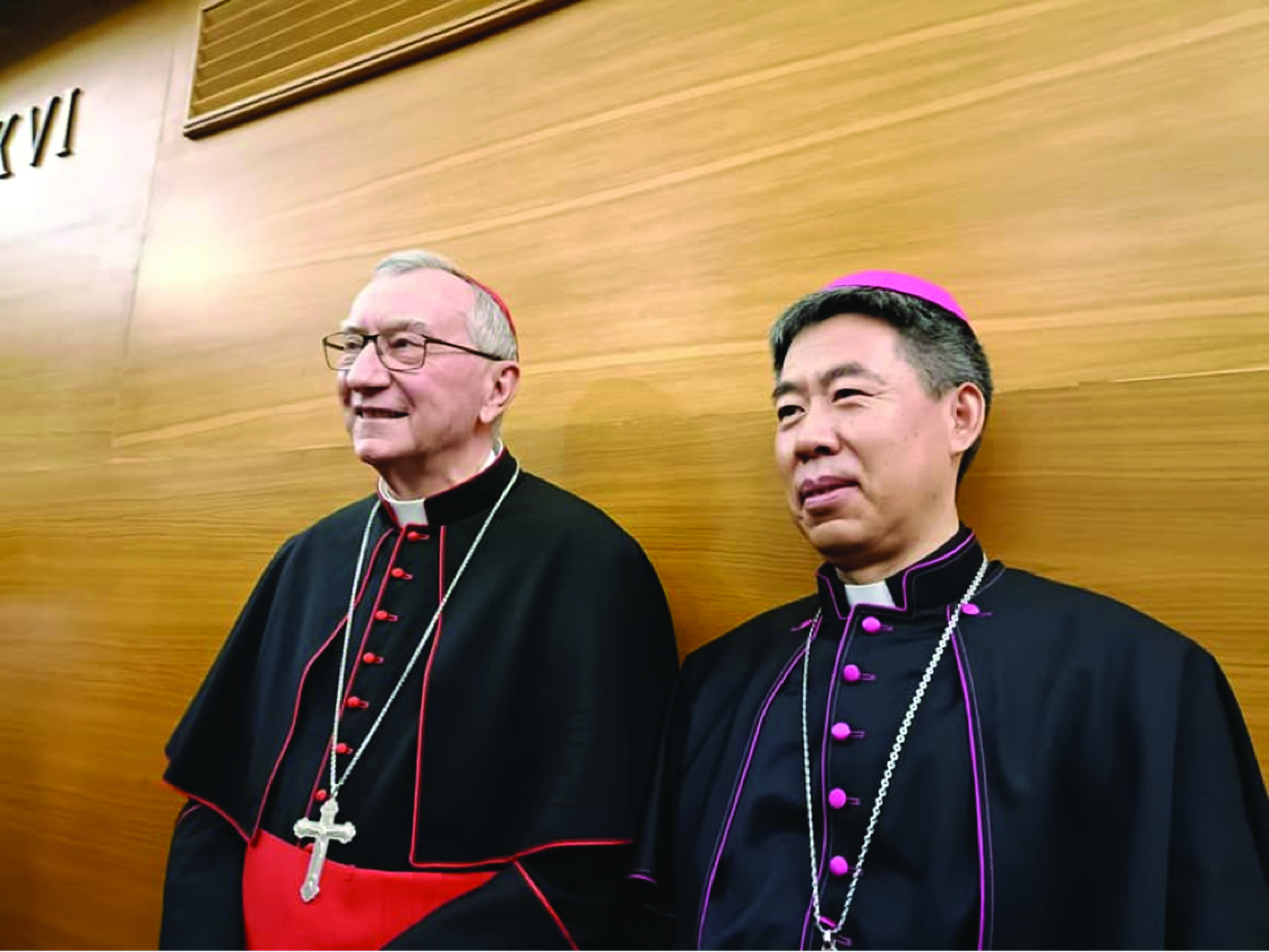
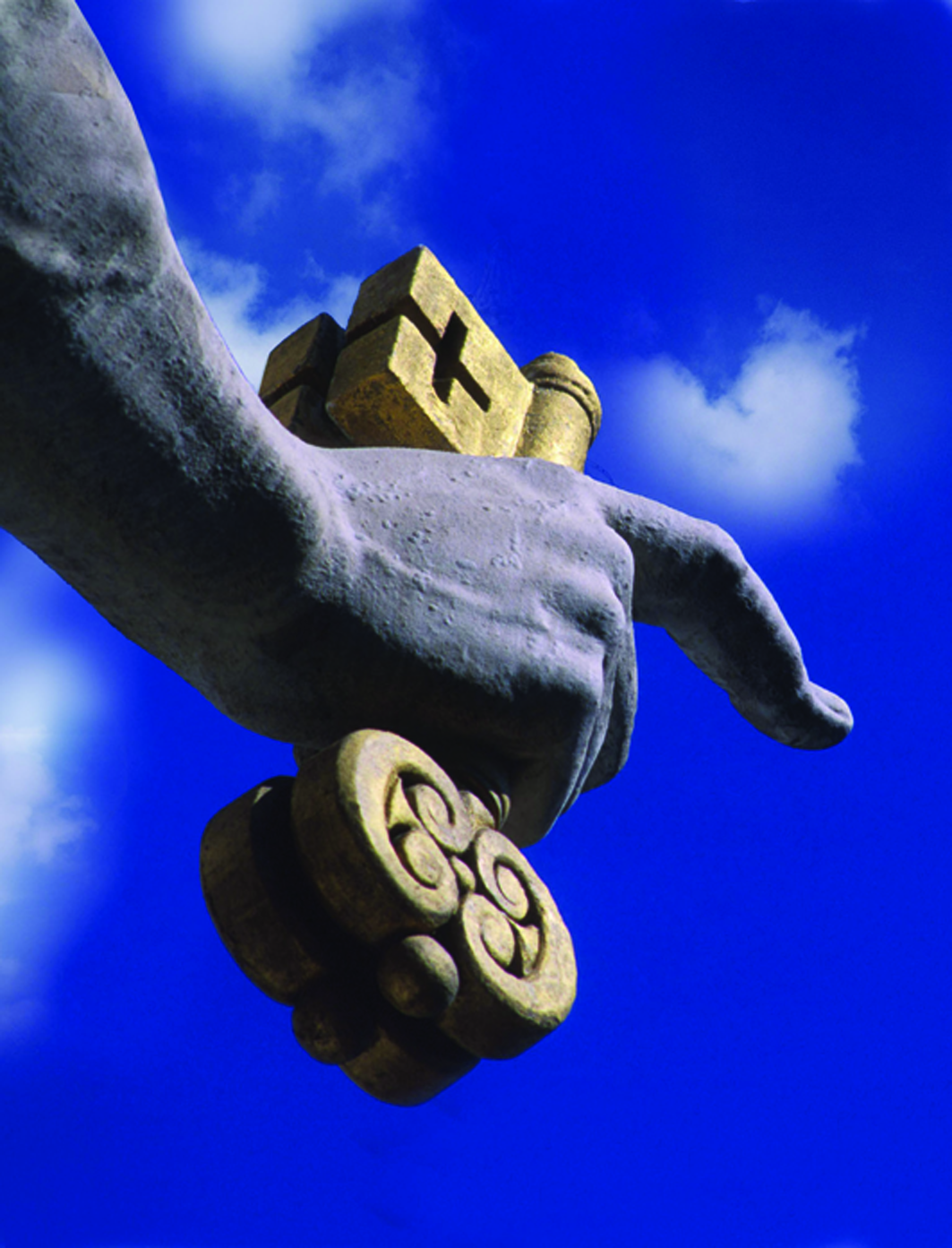

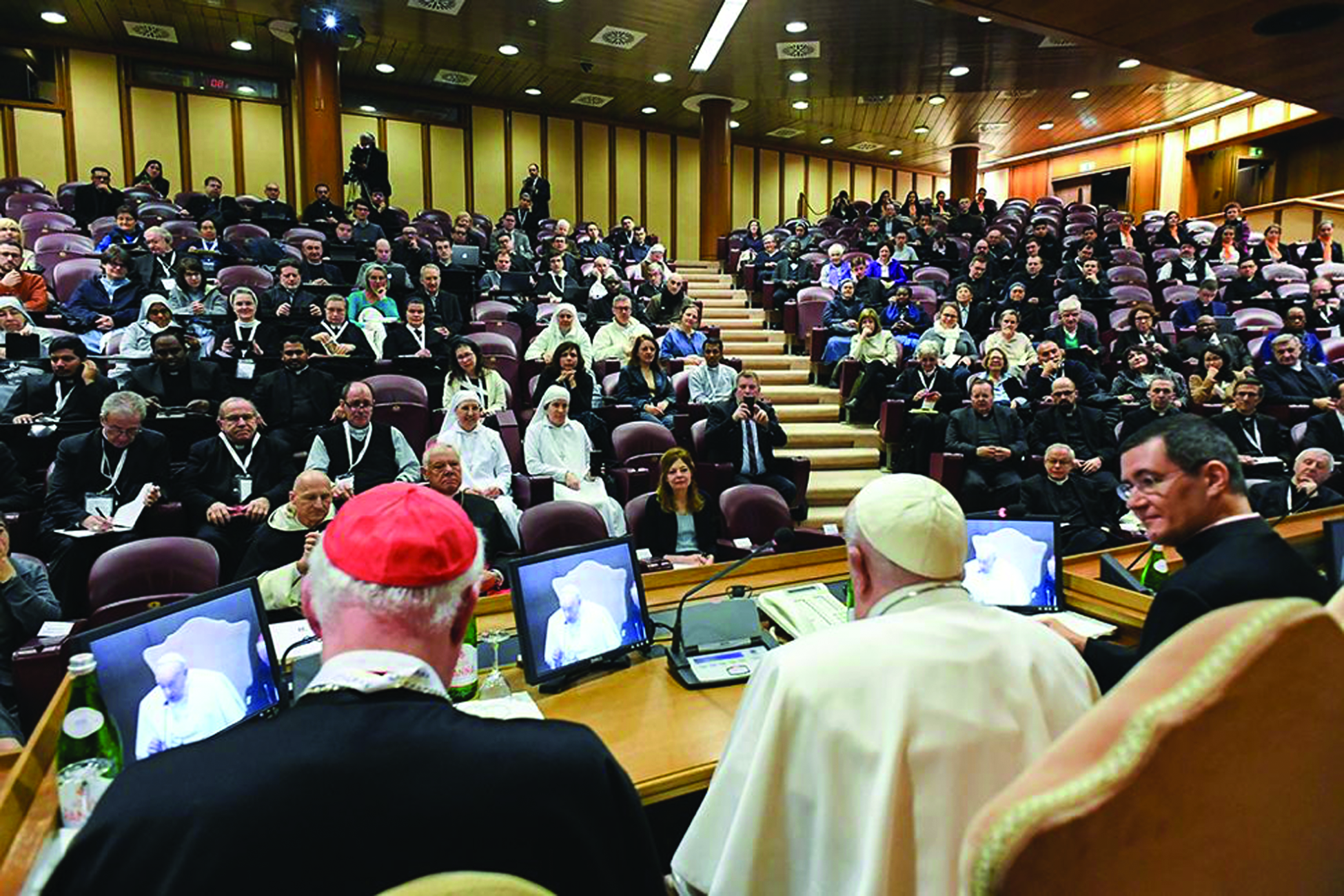
Facebook Comments